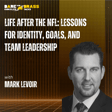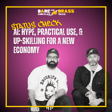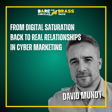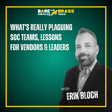
From SOC to CEO, and Learning from Failure to Find Success
Quinnlan Varcoe, founder of Blueberry Security, joins the show for a raw conversation about building a security startup!
Quinn takes us through her wild ride from SOC analyst to founder - including how she shut down her business only to relaunch it stronger than ever.
George K and George A talk to Quinn about:
- Finding your true product-market fit in the security services space
- The brutal reality of B2B sales cycles (hint: they're WAY longer than you think)
- How literally ONE client call changed everything while she was recovering from surgery
- Her narrative-based approach to security operations training
Plus, Quinn opens up about her experience as a trans founder in cybersecurity, navigating both professional challenges and today's political climate.
This episode is PACKED with insights for founders, security practitioners, and anyone interested in the human side of building something from scratch.
---------------
🏳️🌈 Pride Month is just around the corner! We're once again running our t-shirt campaign to raise money for scholarships for LGBTQ+ students in cybersecurity programs.
In the month of June, all profits from any Pride gear purchased from the BKBT Swag Store will be donated.
Set your reminders for June, and check out the collection: https://bkbtpodcast.shop/



















